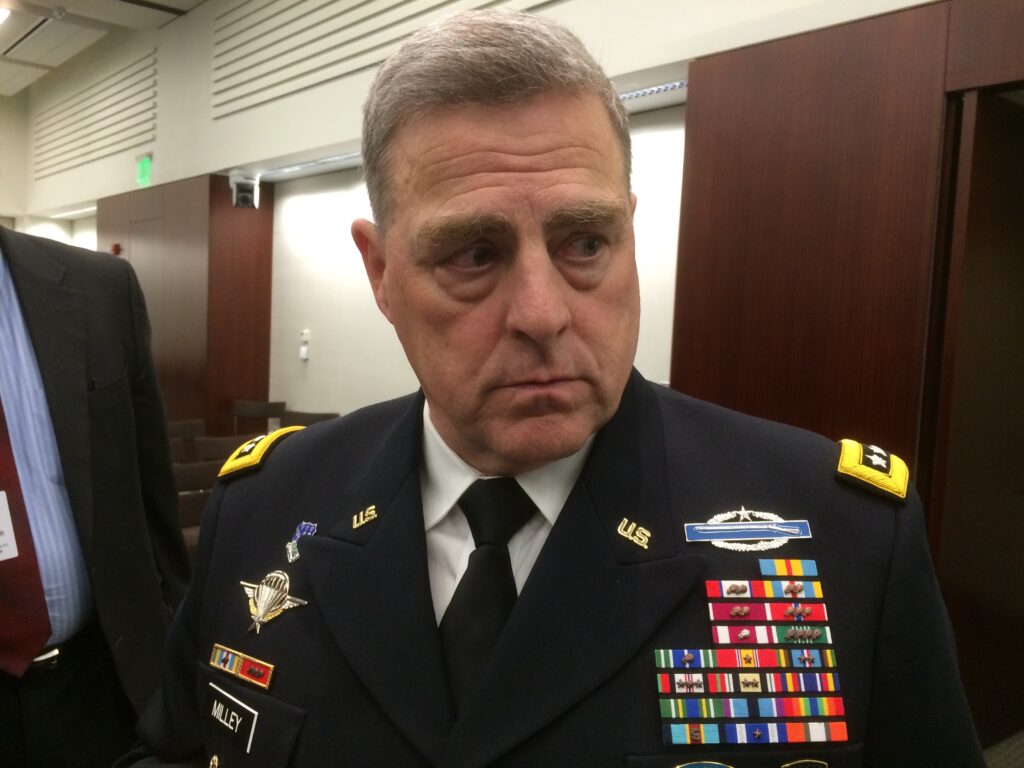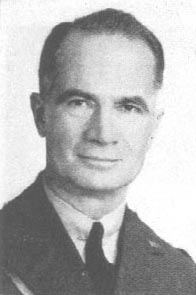
Gen. Mark Milley
WASHINGTON: The defense bill now on President Obama’s desk would restore long-lost procurement powers to the top officers of the armed services. That’s great, the new Chief of Staff of the Army said last night, but it’s just a start.
“Cut us loose, and see what happens,” Gen. Milley said last night at the Council on Foreign Relations. “If we fail, fire us.”
The whole dysfunctional acquisition system needs to be deregulated and decentralized, Gen. Mark Milley said. Officers doing acquisition need more freedom, longer tenure, and — critically — stricter accountability.
“Empower the PEOs [program executive officers], empower the [Army acquisition executive] Heidi Shyus of the world, empower the service chiefs,” Milley continued. “Set a standard for ’em. If you meet the standard, green light go, pin a medal, get promoted. If you fail, you’re out.”
“I’m the senior military officer in the United States Army,” Gen. Mark Milley told reporters after his public remarks. “Some would argue that it’s too much on a service chief, [that] you’re not an expert on acquisition… My comeback to that, though, is I’m not a lawyer either, but I have been a general court-martial convening authority; I’m not a doctor, but I’m in charge of doctors.”
Along with his counterparts for the Air Force, Navy, and Marine Corps, Milley told reporters, “we should be the guys calling the ball on the acquisitions programs. We should be the ones approving the acquirements – the major system requirements — [and] shepherd[ing] that system through the whole acquisition process.”
“The entire way in which requirements are developed, certified, approved, etc. … the service chiefs need to be put in charge of that. Right now they’re not,” Milley told the Council audience. “With Goldwater-Nichols [in 1986], service chiefs were cut out of this process.”
(Pentagon acquisition chief Frank Kendall, otherwise an opponent of expanded powers for service chiefs, has said publicly he favors their involvement in requirements).
Milley cited two models for how an alternative approach might work. “There are two niche areas in the Department of Defense that actually, in the acquisition area, work very well. One is the nuclear sub stuff,” he said. “The other is the Special Operations Command.”
“They run on the same rules, same stacks of paper, [so] why can they adapt, innovate and produce outcomes faster, better?” Milley asked. There are many lesser factors, he said, but there’s a singular fundamental difference: the commanders are involved and the commanders are placed by law in charge.”
Milley’s first example, SOCOM, is unique among military organizations because it combines the operational authorities of a combatant commander with the acquisition authorities of a service. SOCOM’s procurement budget is relatively small — it gets most of its equipment through the services — but with what it has, SOCOM has earned a reputation for innovative, fast-moving programs. The NDAA, which should pass in an amended form if President Obama does veto it, contains language granting Cyber Command authorities similar to SOCOM’s, something Milley favors: “Turn it over to [Adm.] Mike Rogers [head of CYBERCOM],” he said. “Say, ‘Mike, go take Iwo Jima’ [i.e. tackle the difficult challenge of developing cyberwar software]. Give him some parameters and he can develop it for all of us.”
Milley’s other example is the Naval Nuclear Propulsion Program, which exists in a strangely liberating limbo between the Department of Defense and the Department of Energy. What’s more, the head of “NR” (short for Naval Reactors) is a four-star admiral appointed for an eight-year term. The stability this imparts to the nuclear program is so important, Milley noted, that there was an uproar when Adm. John Richardson was pulled out of the job early to become Chief of Naval Operations. (Breaking D readers knows this because we broke the story.)
But can you really apply this model to the Army, one reporter asked, when program managers might spend several years, at best, running something whose success or failure won’t be evident for a decade?
“That is a big problem. That is a big issue,” Milley acknowledged. “We reassign people every year or two or three, so you lose that accountability; whereas in the commercial world, [one person] may be the project manager for that thing for 10 years.”
“The question is, can you replicate that [Naval Reactors model]?” Milley said. “I think for the program officers, the PEOs [program executive officers], and some of the… technical acquisition experts, I think yes, you probably could.” The Army would have to overhaul or make exemptions to its personnel management rules, Milley said — the promotion system notoriously punishes officers who stick to one specialty and rewards those who hold a wide range of jobs in a short time — “but that’s doable.”
It’s not just the personnel bureaucracy Milley wants to overhaul. It’s the entire culture of the famously rulebound service. Army HQ in the Pentagon has issued 243 all-Army messages and 247 execution orders just since January 1: “That’s 500-plus orders and it’s only October,” he said. “More than one order a day.”
‘That’s nuts. That’s crazy,” Milley said. “We are over-centralized. What needs to be done is let loose the reins,” he said. “Empower ’em — but the flipside of empowerment is accountability.”
But does the Army hold senior leaders accountable? In contrast to World War II, when Gen. George Marshall purged the officer corps of those who could not mentally or physically handle their jobs, the modern Army has a better reputation for protecting generals rather than for firing them, I noted.
“What you articulated is a big perception” that’s out there, Milley replied. “I would tell you the perception is inaccurate. It’s historically and factually wrong. I’m not going to cite names, but I know plenty of four-stars, personally, that exited stage left for accountability reasons… They exited for [poor] performance. We just don’t advertise it,” he said. “We just don’t think that we should go back to the scarlet letter on your forehead and brand you for the rest of your life.”
“You go out and you start losing battles in wars…or billions of dollars [in acquisition]… you’ve got to come out of the game,” Milley said. “I advocate that and I’ve done it and held plenty of people accountable.”

Maj. Gen. Terry Allen, famously removed from command in World War II
This question clearly struck a nerve. (Here I’ve just pulled highlights of Milley’s detailed and impassioned answer.) In fact, at the reception after his remarks, when I approached Milley for an informal hello, the four-star took me by the sleeve and pulled me along to the hors d’oeuvres (“Are those sliders?” “No, sir,” I said, “they’re some kind of veggie, uh, thing.” “Can’t have that.”) — not because I’m particularly charming company, just because he was hungry but didn’t want to stop disabusing me of my misperceptions while he ate. Milley recited facts and figures on general officers dismissed dating back to 1939, with a facility and fervor lesser men use to discuss their favorite football teams.
Both in public and in private, Milley is unusually relaxed with reporters for an Army four-star. The largest service is also always the least media-savvy, and its battle-hardened Chiefs of Staff often resemble bulls in a china shop. But there are very different breeds. Eric Shinseki could plow, unblinking, through the porcelain on issues like wheeled vehicles, black berets, and the occupation of Iraq. Ray Odierno, the last chief, was cautious and conscientious, painfully aware of how much political china a misjudged word could smash. Mark Milley, by contrast, clearly enjoys being the most powerful animal in the room, performing for the audience with provocative statements, wry asides, and even his body language.
In 75 minutes at the Council on Foreign Relations, Milley probably got more laughs than many previous Chiefs got in their entire four-year term.
“I apologize for going slightly over time,” said moderator (and Navy Undersecretary nominee) Janine Davison, “but I think it was worth the entertainment factor. Thank you very much….
Milley interrupted, deadpan: “I’m glad I could provide Janine entertainment.”
Everybody clapped. Skeptics might think Milley’s relative lack of experience inside the Beltway would be a weakness, but so far he’s proven savvy enough to win over audiences both in and out of Washington.
Move over FARA: General Atomics pitching new Gray Eagle version for armed scout mission
General Atomics will also showcase its Mojave demonstrator for the first time during the Army Aviation Association of America conference in Denver, a company spokesman said.


























